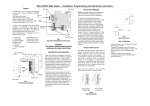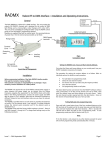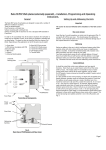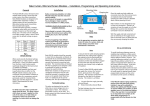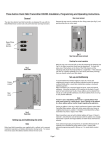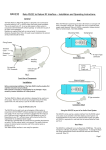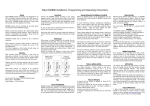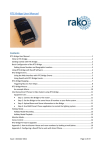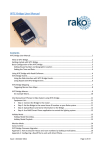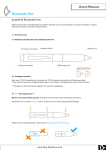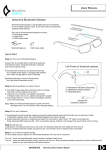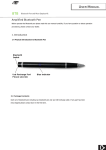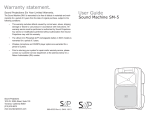Download Instruction Manual
Transcript
Rako RAH07 Hand-Held Controllers, Programming and Operating Instructions Indication LED Scene buttons Master raise lower Fig. 1 Front View Rako hand-held transmitters are supplied with a pullout tab to prevent inadvertent operation and battery deterioration during transit. To remove this, first remove the rear cover by removing the four fixing screws and pull the tab out. Care should be taken not to touch or otherwise damage any of the other electronic components. The Rako hand-held should now be operational. To check this press one of the front buttons and the indicating LED should illuminate briefly for a single flash. If the LED does not flash or it flashes repeatedly for a short burst (low battery warning) then you should contact Rako controls on the number given below. Battery retaining clip Batteries Fixing screws Protective tab Setting the address switches. Always use two CR2016 Each Rako transmitter has two, 8 way banks of switches for setting its address. The two sets of switches allow the user to choose from 256 house addresses and 256 room addresses. To set the address, remove the rear cover whereupon the banks of switches will be now become visible. To set an address, use a small terminal screwdriver or similar device and carefully move some of the switches into the ‘ON’ position. Addressing uses binary encoding and the value of the switches is shown below. Note: Any control panels set with the same address will act as two or multi way controls. Rear cover Fig.3 Rear View with cover removed Addressing Fig.2 Rear View Before using a Rako hand-held the address switches on the rear need to be set to an appropriate House and Room address. Setting an address is the way in which interference between other Rako systems, either with other rooms within your house BINARY VALUE Addressing switches 128 64 32 16 8 4 2 1 House address = 128+16=144 128 64 32 16 8 4 2 1 ROOM Checking for correct operation Rako hand-helds are powered by batteries. The designed battery life is better than 3 years (based on 30 button presses daily) but the batteries will eventually need replacing. In normal use the Led on the front panel illuminates momentarily when a button is pressed to indicate that a (radio) transmission has been made. When the batteries are approaching the end of their useful life the Led will continue to blink after a button has been pressed. When this starts to happen the batteries should be replaced as soon as possible. To replace the batteries remove the rear cover and carefully slide out the batteries. Replace with new batteries ensuring that the positive (+) terminal makes contact with the battery clip and the negative (-) terminal with the pad on the circuit board. To ensure reliable operation always ensure that battery contacts and battery surfaces are kept clean of any grease, moisture or other contamination. Warning Lithium batteries may explode if handled incorrectly. Always dispose of used batteries in accordance with manufacturer’s recommendations. General Rako thanks you for having purchased a Rako product and hopes that you are pleased with your system. Should for any reason you need to contact us please contact us via our website www.rakocontrols.com or by phoning our customer help line on 01634 226666. ON This section be read and followed before using your Rako handset. BINARY VALUE The Rako RAH07 controllers are designed for convenient hand-held control of a Rako lighting system. They have all the operating and programming functions available associated with Rako RCP07 control panels and can be used either on their own or in conjunction with the wall panels. Battery replacement or neighbouring houses is avoided. It should be remembered that with a booster unit a Rako transmitter may have a range of over 100m. Your Rako control panel comes set with a default address of House 1 Room 4 and whilst the unit will function with this address it is strongly advised to select your own house address and logical room addresses. Once set, any receiver modules need to ‘learn’ the address of the control panel/panels that they need to respond to. To address a receiver module see the module’s instruction manual. HOUSE Important ON General Room address = 32+4=36. Fig 5. Addressing Switches Page 1 Page 2 Once levels are set correctly for the chosen scene. Save any changes by pressing button 4. Circuits will all flash to confirm. Step 4 If at any point it is not clear which is the current circuit address button 3 will flash that circuit without scrolling on. Tip As each circuit flahes in turn, use the raise and lower buttons to adjust lighting to the desired levels Step 3 Chose the scene to be re-programmed. Put controller into programming mode by pressing and holding the selected scene button and both raise and lower buttons together Step 1 TIP Press the scene button first Button 1 2 3 4 Off Action Scroll up and ident Scroll down and ident Ident only Save changes Exit programming Step 2 Button 2 scrolls down through channels15-1 All circuits flash to indicate channel 0 Button 1 scrolls up through channels 1-15 15 0 1 5 10 6 9 8 7 Step 5 Continue incrementing channels with button 1 to reach 0 or return using button 2 13 12 11 Scrolling flashes each existing circuit in turn 4 Press Off button to exit controller from programming mode. To re-program another scene repeat process from Step 1 14 2 3 See details for scrolling When in programming mode buttons have the following functions LED starts to flash after 5 seconds, panel is now in programming mode. Use buttons 1 & 2 to scroll through channels one at a time. Programming a Scene



